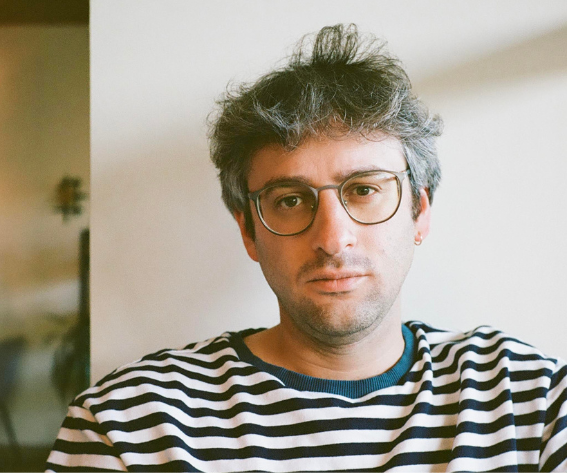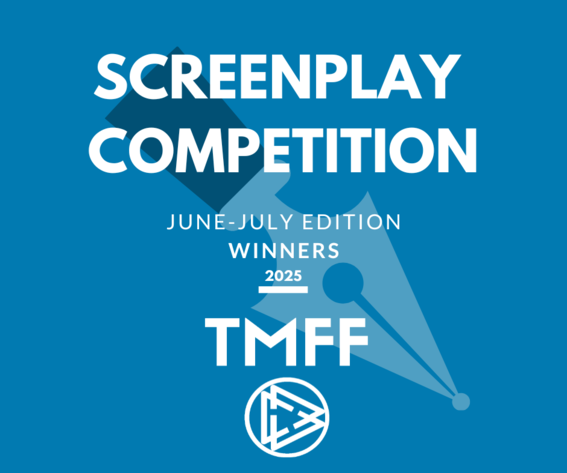July’s Film of the Month, ‘Chop Chop!‘, doesn’t tiptoe around its themes, it charges in with razor-sharp wit and emotional bite. A bold, unflinching dramedy about tradition, identity, and the messy intersections of family love and cultural expectation, ‘Chop Chop!’ claimed four major honors this month: Film of the Month, Student Film of the Month, Director of the Month, and Screenwriter of the Month. At its heart is a Scottish-Pakistani father caught between his own beliefs and his orthodox father’s ultimatum to circumcise his young son. The result is a story that’s at once tender, volatile, and wickedly funny, driven by performances that cut deep and writing that refuses easy answers. We spoke with Ievgen Koshyn, the film’s director, about balancing humor and heartbreak, exploring generational rifts, and why ‘Chop Chop!’ resonates far beyond its cultural roots.
TMFF: What drew you to tell this story through the lens of a Scottish-Pakistani family?
IK: Our Kino Eyes masters program in Edinburgh Napier University is international – 24 filmmakers from all over the world, each with different backgrounds, are split into teams and sent to one of four countries: Scotland, Ireland, Portugal, and Estonia. My writer, Amir Masoud Soheili, and I landed in Scotland. At first, all we really knew about the place were clichés — bagpipes, bare asses in Brave Heart and “Freeeeedom”, Mary Stuart — so we started looking for a universal story based on local material that could connect to both of us. After exploring many ideas, Masoud suggested this one, based on my sensibilities and my past work. Even though neither of us is Scottish or Pakistani, the theme of living “on the edge of worlds” – in-between cultures, countries, identities, and expectations – felt very close to us.
Masoud also has a Muslim background, which gave us some cultural proximity to the Pakistani experience. Plus, the Pakistani community is one of the largest minorities in the UK, particularly in Scotland, so we had access to people who could share details about their lives. This let us approach the story with authenticity, while following a rich British film tradition of portraying Pakistani families – films like East Is East, Blinded by the Light, or Bend It Like Beckham. That mix of a partially insider’s perspective from Masoud and an outsider’s curiosity from me became the heart of ‘Chop Chop!’
TMFF: Your director’s statement recalls vivid childhood experiences with religious persuasion. How much of that personal history found its way into the tone and humor of ‘Chop Chop!’?
IK: Honestly, my time in a Jewish religious school in Donetsk, Ukraine, my hometown, was pretty rough. Humor was my way out – it helped me survive both the pressure from rabbis and the bullying from classmates. Since then, I’ve never really connected with “pure” comedy. For me, humor is tied to pain, and that’s why I’m drawn to tragicomedy. Back then, as a teenager, I was rebellious and awkward, trying to mock everything around me – sometimes saying silly things, sometimes just acting out. That period shaped me as a person and as a storyteller. It also gave me the belief that no subject is off limits for humor, even something as sensitive as circumcision.
I still remember these young American Hasidim with tender first beards coming to school, trying to convince us to get circumcised – talking to us, 12 y.o., all this usual nonsense about hygiene, love life, and even offering a brand-new PlayStation to anyone who agreed. Nobody raised a hand, but a week later the Trifonov brothers had shiny new consoles, and the rest was obvious. That’s very much the essence of Jewish humor to me – laughing at things you’re “not supposed” to laugh at, and most importantly, laughing at yourself. So if it seems like Masoud and I are joking about sensitive topics in ‘Chop Chop!’, in reality we’re trying to make jokes about ourselves. It’s just that our stand-ins happen to be Usman, Hamza and Idris – our Scottish-Pakistani alter egos.
TMFF: The film blends tragedy and comedy, two tones that can be difficult to balance. How did you find the right rhythm so the humor doesn’t undercut the emotional stakes?
IK: It was tricky, but I kept it grounded in the characters’ real emotions. We didn’t push for gags – moments like the peeing scene or the clinic waiting room are funny because they’re awkward and human, not slapstick. On set, we made sure the emotional beats, like the family tensions or the ending, felt raw and true. In the edit, Malek Ben Khaled helped shape the rhythm so the humor flows in naturally without stealing from the heartbreak.
Honestly, I don’t really believe in “pure” tragedy or “pure” comedy. Even the earliest film comedies – from L’Arroseur Arrosé to Buster Keaton – are about sad or unlucky things happening to someone. We laugh because something’s gone wrong in their life, even if it’s just slipping on a banana peel. For me, Keaton is the perfect example of tragicomedy – whatever disaster hits him, his face stays completely deadpan. That poker face is the bridge between the two tones, and it’s something I kept in mind while balancing the humor and pain in ‘Chop Chop!’
TMFF: How did you work to make this story resonate?
IK: It’s hard to judge, because every audience has its own sensitivity and sense of humor. I don’t believe there’s a magic formula that works for everyone. As one of my directing teachers, Vladimir Livshits, used to say – you try to pour something into a vessel, but for one person it’s a teacup, for another it’s a bucket, for someone else just a thimble. You only have a certain amount of liquid, so sometimes you overflow the cup, and sometimes in the bucket it barely covers the bottom. All you can do is pour with care.
For ‘Chop Chop!’ I tried not to push too hard in either direction. We went through around fifteen drafts of screenplay, cutting everything that felt unnecessary. Sometimes we wandered too far into dark humor or silly dick jokes, other times into heavy melodrama. Finding the right balance was key – trimming the excess, keeping the tone human – and that’s probably why the film can reach at least some viewers on an emotional level.
TMFF: Identity and belonging are recurring themes in your work. How do your own experiences as a Russian-speaking half-Jew from Ukraine inform your storytelling choices?
IK: Indeed, identity and belonging have always been at the center of my life. Paradoxically, I’ve spent my whole life wanting to be part of a group while also resisting any strict institutional rules. As a kid, I wanted to be invited to play football with other boys even though I couldn’t play. In Jewish school, I followed the rituals but knew I wasn’t “fully” Jewish unless I converted. That feeling of being the “mudblood” from Harry Potter never quite left me. My blood is Ukrainian, Jewish, and Russian, and I feel that all these cultures shaped me. And while Russian culture gave me a lot, Russia also forced me from my home in Donetsk in 2014 and, in 2022, launched a full-scale invasion of my entire country, bringing unimaginable suffering – killing, injuring, torturing, displacing, and orphaning hundreds of thousands, if not millions, of my compatriots. For that reason alone, I am one hundred percent politically Ukrainian.
In Kyiv, I became part of the Ukrainian film community, but I still never felt entirely at home or accepted. I made my early films in Russian, and now that language is essentially banned in the Ukrainian media space. I understand why, but it’s still painful to see the language my mother sang to me in as a toddler treated as the enemy’s tongue. All these identities conflict inside me, especially the Ukrainian and Russian ones, while my “inner Jew” swings back and forth, repeating Dmitry Vrubel’s famous graffiti on the Berlin Wall: “God help me survive this deadly love.” And my inner Jew is struggling now too – horrified by October 7th, 2023, but also unwilling to identify with Netanyahu’s government in the Jewish State, which is clearly committing an international crime today.
Living between identities has shaped how I see the world – and how I write. I probably envy people with a clearly defined identity, but for me, “being between” has become my default mode. That’s why I felt comfortable with Hamza in ‘Chop Chop!’ – he’s between father and son, between Scotland and Pakistan, between his ex-wife and the family he’s trying to hold together. Maybe being “in between” is the only way to survive as a thinking person – constantly mediating, translating, trying to build bridges and dialogue. In a way, that’s also the role of a director: to be between characters, actors, the audience, the script, and your own personality.
I don’t think identity, whether as the oppressed or the oppressor, fully defines a person. Every person is their own cosmos. There is no single “Ukrainian,” “Russian,” “Jew,” “Scottish,” or “Pakistani” identity – there’s just a specific Hamza, a specific Ievgen Koshyn. I remember watching the coronation when Scotland’s First Minister Humza Yousaf wore a kilt, and the UK’s Prime Minister was Rishi Sunak. Both are of Punjabi origin – one from Pakistan, the other from India. I won’t get into their personalities or political legacies, that’s not my place, but at that moment it felt right. Like proof that living between worlds can be not just possible, but natural. Even now, I’m writing these words from the edge of my own, at least, oecumene – in Baku, Azerbaijan, where I’m working as a 1st AD on a historical project being shot across five Turkic countries.
TMFF: Circumcision is often treated as a taboo or purely religious subject in film. How did you navigate portraying it with both sensitivity and irreverence?
IK: I approached it the way I’d approach any “family secret” on screen – by respecting the seriousness while also leaning into the awkwardness. We didn’t make it preachy or try to pass judgment; it’s less about the ritual itself and more about the pressure it puts on relationships. The sensitivity came from talking with the writer and actors about cultural respect, especially since it’s a Muslim tradition in this context. The irreverence is in the humor – like the “chop-chop” ultimatum or the over-the-top clinic ad – cheeky moments that let us acknowledge how such traditions can feel in modern life without being mean-spirited.
But on a deeper level, what mattered most to me was the child’s experience. Not just the father’s choice or the grandfather’s wish, but the universal terror the boy feels – because to him, it’s all the same. He genuinely believes they’re going to take everything down there, and while that might seem funny from the outside, it’s also horrifying. From the perspective of modern, especially Western, values, any non-consensual “body damage” is a serious ethical issue, which is part of why circumcision is so controversial today. In ‘Chop Chop!’ the real drama is about someone trying to take away a child’s freedom to choose. And no matter how much I empathize with each of the adult characters, in that moment I’m a thousand percent on the boy’s side.
TMFF: You’ve said you’re drawn to “bittersweet stories with a pinch of deadpan humor.” What cinematic or literary influences have shaped that?
IK: I always feel a bit awkward talking about “influences,” as if I’m some grand old master lounging with a glass of whisky saying, “Well, you know, with Fellini… with Godard… and of course Eisenstein.” The truth is, I’m pretty omnivorous – I love everything from Isaac Babel to Monty Python to the warm American comedies of the ’90s. But if I have to name the one filmmaker who’s been a consistent influence on my own work, it’s Aki Kaurismäki. I admire him both as an artist and as a person – I’ll never forget the story of him drunkenly trying to stuff a Berlinale Golden Bear into the pocket of his tuxedo. Meeting him is on my bucket list, whether in his winter home in Portugal or on the streets of Helsinki.
I’m also inspired by Taika Waititi – Hunt for the Wilderpeople, Boy, and especially Jojo Rabbit – the way he mixes humor and heartbreak is masterful. But probably the closest film to my own sensibility, and one I consider almost perfect in terms of tone and storytelling, is Little Miss Sunshine. It’s a genuine piece of art where every laugh comes from a place of truth, and the humor never undercuts the emotional core. That balance is exactly what we were trying to achieve in ‘Chop Chop!’– to make you smile while keeping your heart in the game.
TMFF: Your past work spans shorts, TV series, and now this film. What unique challenges did ‘Chop Chop!’ present compared to your earlier projects?
IK: For me, ‘Chop Chop!’ was a very different kind of challenge. By the time I started my studies at Napier in Edinburgh, this was already my second film education. After my first film school in Moscow, I’d worked in the industry as a 1st AD, TV director, and made several shorts that had done well at festivals. So going back into a student environment, with student budgets, after working on a €500,000 TV movie as a writer-director, was… let’s say humbling. Once again, I had to get creative with limitations. Luckily, our brilliant Serbian producer, Andjela Jevtović, managed to squeeze every drop out of our modest funds.
From a creative point of view, there were several tests. First, shooting in English – a language I’ve studied my whole life but don’t think in – meant I was never going to feel the same instinctive connection to its poetry as a native speaker. The mix of slightly broken English and Urdu in the film turned out to be an advantage, helping us find an authentic voice. Second, this was truly a collaborative project. I didn’t write the script – Masoud Soheili did – and the whole Kino Eyes group had input during development. This isn’t a monologue of one author but a polyphonic piece with everyone’s fingerprints on it.
Another challenge was telling a story set in Scotland after only spending a few months there. We arrived with a bag full of clichés from books, films, and TV, and had to quickly learn the unspoken cultural codes. On top of that, UK labor laws were much stricter than I was used to. For example, the working hours allowed for our child actor were so short that we had to redesign our shooting schedule entirely. There were also very specific requirements for his comfort – including having a separate toilet on location – and while it sometimes felt excessive in the context of a small student production, we worked hard to meet those standards while keeping the shoot viable.
And, of course, there were the unpredictable disasters. Shortly before the shoot, our Armenian cinematographer had to step away for health reasons, just two days before cameras were meant to roll. That meant redoing everything – locations, crew, schedules – and for a while I thought the project was finished before it even started. Fortunately, we were rescued by our wonderful Croatian DOP, Antonio Pozajević. And thanks to the persistence of myself, our sound designer Masha Ivashchenko, and others in the crew, we pulled through and made the film. It’s a small movie, but I hope it was worth the fight.
TMFF: Generational, religious, and cultural pressures complicate the father-son dynamic in the film. How did you work with your actors to capture that layered relationship authentically?
IK: All three of our actors came from very different acting backgrounds, which shaped how we built the father-son-grandfather dynamic and made the cultural context feel real. Mehmood Sultan from Bradford, who played the grandfather, had an extensive career in Pakistani and Indian films, with their naturally heightened expressiveness, so I often had to gently tone him down to fit our more understated style. Kareem Nasif, who played Hamza, is a graduate of the Royal Conservatoire of Scotland and comes from a Stanislavski-based tradition, so we spoke the same “director–actor” language, working through the subtext together in rehearsals – sometimes over Skype with Mehmood. But when it came to the cultural and religious context, it was the other way around: Kareem and Mehmood were teaching and directing me. They immersed me in the details, codes, and nuances of their world, sharing things I could never have learned from books or research. With young Jashian Soni as Idris, the main task was simply to preserve his natural energy and point of view. In many ways, the actors were like their characters – Kareem warm and a little self-effacing, Mehmood a deeply observant Muslim, and Jashian just a kid with a thick Glaswegian accent I could barely follow at full speed.
TMFF: If audiences leave ‘Chop Chop!’ debating one specific question or idea, what would you want it to be?
IK: There’s a lot you could take away from ‘Chop Chop!’ – questions about agency and free will, about how relevant certain religious traditions feel today, and even whether it’s “safe” to touch topics like this in film. But while rewriting the script with Masoud, I kept coming back to a line by the great Ukrainian Russian-language poet Alexander Kabanov: “Deprived of deafness and blindness, I quietly grew bridges between two homelands that didn’t need me.” For me, this film is exactly about those bridges – between generations, between cultures, between countries and traditions. If audiences walk away thinking about the bridges in their own lives, and whether they’re building them or burning them, I’d consider that the most valuable conversation the film could spark.









Jake
First one